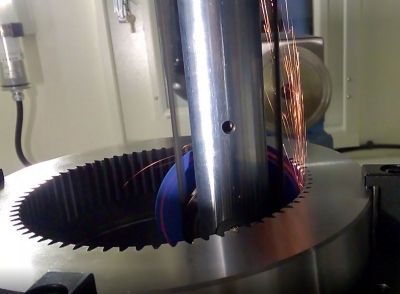NUM Helps Automate Production of Involute and Cyclodial Gears for Robotics
NUM is helping the Taiwanese machine tool company Chien Wei Precise Technology to develop innovative CNC grinding machines for manufacturing specialist gears used in robotics applications. Based entirely on NUM’s latest-generation Flexium+ 68 CNC platform, Chien Wei’s new machines are designed to speed the production of both involute and cycloidal profile precision gears. They are believed to be the first gear grinding machines on the market that are capable of handling both types of gear profile. There are two versions of the grinding machine, one for internal gears, the other for external gears.
Robotic systems typically use either planetary gearboxes equipped with involute gears, or cycloid drives based on a combination of a reduced epitrochoid rotor and a cycloid stator. While planetary gearboxes have been around for a long time and enjoy extensive use, cycloid drives have far fewer moving parts and offer a more efficient means of achieving extremely high reduction ratios. A speed reducer with a ratio of 200:1 would typically need a chain of three planetary gear boxes with twelve moving involute gears. The same reduction ratio could be achieved with a cycloid drive using one stator and one rotor. However, cycloid gears are notoriously difficult and expensive to manufacture.
In 2015, Chien Wei decided to bring gear manufacturing in-house, by developing its own gear grinding machine. By producing its own gearboxes the company could control quality, shorten lead times and reduce costs. It would also enable it to sell gearboxes to machine builders – and possibly the machines themselves to gear manufacturers.
Chien Wei initially based its gear grinding machine on a Fanuc series 0i-MF CNC system, which it uses for other machine tools, together with Mastercam CAD/CAM software and its own CMM. But it soon became apparent that the profile complexity of cycloidal gears meant that CMM data was inadequate for controlling the manufacturing process. Another major disadvantage was that customers wishing to purchase the machines would also need to invest in an expensive CAD/CAM system and extra personnel.
According to Chien Wei’s President, Mr. Lee, “We quickly decided that what we needed was a CNC system that fully supported gear grinding from the outset, so that our customers could simply input the parameters of the gear they wanted, with the CNC then controlling all aspects of the machine’s dressing and grinding processes in real-time. NUM was an obvious choice, because of its proven expertise in CNC gear grinding applications. The company was also willing to collaborate in the joint development of the CNC system, which includes an application-specific HMI (human-machine interface) and various dedicated control functions.”
The new generation of Chien Wei’s gear grinders together with NUM’s new profile grinding technology now provides the ability and flexibility to manufacture both cycloid and involute gears on the same machine.
Adrian Kiener, CSO Asia and managing director of NUM Taiwan, points out that this application highlights the importance of NUM’s decentralized support strategy. “By providing direct access to the CNC experts and extensive development facilities we have here in Taiwan, as well as those in many other countries around the world, we are able to provide our customers with a very fast response service that helps them shorten their time-to-market significantly. In combination with the knowledge and experience of our gear product group in Switzerland, this led to the complete package that NUM is providing. It includes the user interface, technology and calculations, as well as all the NC cycles.”





